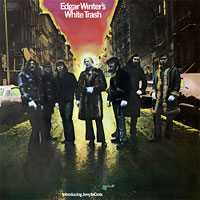Edgar Winter • Edgar Winter's White Trash
 dgar Winter, unlike
brother Johnny, is hard to pin down musically. Whereas Johnny was strictly a blues rocker,
Edgar’s music was all over the map, with influences that included rock, blues, soul,
jazz, big band and funk. Edgar dipped his toes in diverse musical waters to create a sound
unlike any that, until that time, had been heard. dgar Winter, unlike
brother Johnny, is hard to pin down musically. Whereas Johnny was strictly a blues rocker,
Edgar’s music was all over the map, with influences that included rock, blues, soul,
jazz, big band and funk. Edgar dipped his toes in diverse musical waters to create a sound
unlike any that, until that time, had been heard.
White Trash is Edgar Winter’s second album, the follow-up to his critically successful debut, Entrance. For White Trash, Winter gathered a group of nine musicians (including producer/guitarist Rick Derringer) to create a small big-band and replicate the southern soul/rock/blues sound he had percolating in his head. To a group that contained the usual guitar, keyboards, bass and drums, Winter added the then-unusual small horn section. Other than Winter and Derringer, none of the musicians was a household name at the time, but all of them had the requisite skill to help make the album a springboard for Winter’s entrance into the upper echelon of the day’s rock scene, thanks to the charting hit "Keep Playing That Rock and Roll." The balance of the album was equally as strong, with songs that kept the groove rolling right along. Listening to these songs 45 years after the album's initial release shows that they still sound as fresh as they did when they were recorded. There is a consistency to the music, thanks to Winter’s writing (or co-writing) all but one of the tunes here. White Trash was an Epic recording, and that label had a reputation for providing above-average sonics. The Speakers Corner pressing is perfectly flat and very quiet, allowing the recording's potential to be realized. There is a profusion of amplified instruments here, which makes identifying the sound of any one a bit more difficult than with acoustic instruments, but they are not lost in a hazy mix. The soundstage is a bit flat, but it is wide, with a sense of space surrounding each instrument. The bass and horns come off best here, sounding vivid and underpinning the music's soul. Vocals are not especially immediate, but that was a common occurrence with rock recordings of the day. What ultimately saves White Trash, and vaults it
above many of its contemporaries, is a feeling of cohesion and expressiveness that just
draws you into the fun these nine musicians had making this album. The music is so
infectious that you want to listen all the way though. This is an album long overdue for
serious reissue, and thanks are in order to Speakers Corner for having the foresight to
take matters in hand and give us what is likely the ultimate version of this record. |
